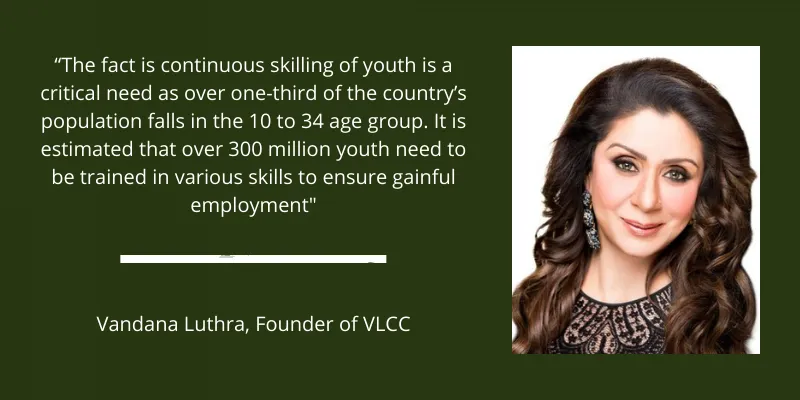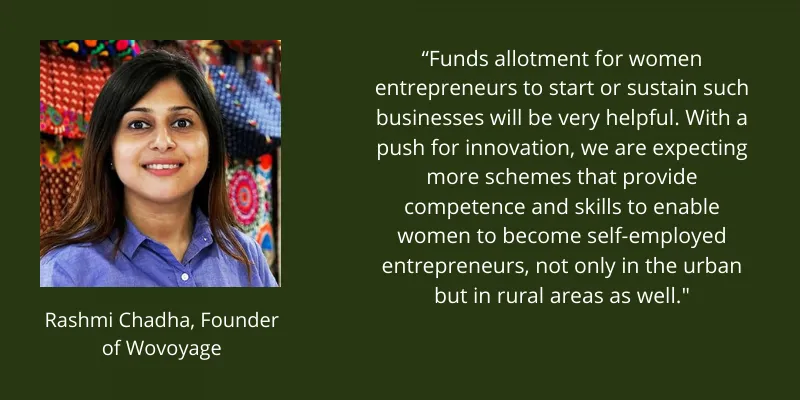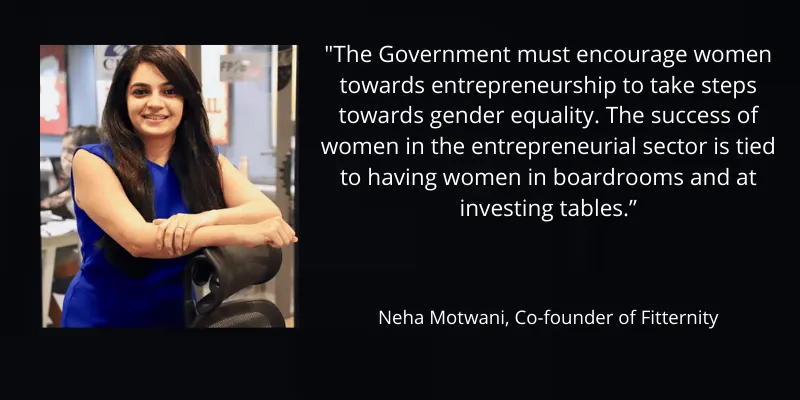Lower taxes, focus on skilling and other things Indian women expect from FM Nirmala Sitharaman
Amidst the COVID-19 pandemic that has disproportionately impacted them, young girls and women in India are hoping that the Union Budget 2021-22 will focus on skilling for employment and supporting women-led ventures for sustainable growth.
The pandemic has undoubtedly taken a toll on the social and economic structures of the world. As countries navigate the economic situation – deemed far worse than the 2008 recession, according to the World Economic Forum women have faced the greater brunt of the pandemic.
It has further affected women’s unemployment with COVID-19 forcing women to drop out of the labour force. Analysis conducted by the World Bank shows that women make up for only 19.9 percent of the workforce while men dominate over 80 percent of the jobs market. This financial insecurity threatens their social safety as well. The situation is no better for those in the workforce as nearly 47 percent of women are facing more stress and anxiety amid the pandemic, according to the LinkedIn Workforce Confidence Index.
One must note that these are additional challenges apart from the existing gender parities like biases at the workplace and unequal pay. Hence, the upcoming budget session that is to be presented by FM Nirmala Sitharaman will decide the course for women’s security and development for the year.
Here are a few things that Indian women hope the budget would incorporate to recover from the impacts of COVID-19.
Skilling women for equal footing in the workforce

Social entrepreneur Neha Bagaria who founded Jobsforher to help women enter the workforce believes there should be an allocation to create a talent pool of women to take part in the increasingly tech-based economy.
"The 2021-2022 budget should accommodate funds for skilling programmes for women to upskill themselves in the latest technologies which will further help them contribute to the country’s GDP,” she says.
As flexible working conditions took centre stage during the pandemic, Neha adds that the government must introduce inclusive policies, perks and benefits so that flexible and contract-based employers can conveniently tap the wide talent pool of women seeking flexible arrangements.
Keerthi Tummala, Founder of Sage Living says women do not shy away from thinking big and taking the risk and hence, providing industry-based skill training programmes can expand their entrepreneurial horizons.
Renowned entrepreneur Vandana Luthra, founder of VLCC Group, says resources allocated towards women’s skill development would be a welcome move. “The fact is continuous skilling of youth is a critical need as over one-third of the country’s population falls in the 10 to 34 age group. It is estimated that over 300 million youth need to be trained in various skills to ensure gainful employment," she states.

“Tax holiday for women-led businesses”
“This year's budget should have a special consideration to support women in the MSME ecosystem by providing them better access to capital. The MSMEs have been badly hit by the pandemic and could use a tax-holiday and reduced interest rates to recover. 2021 should see the provision of government support for women-led startups to help them revive businesses, therefore, easy and cheaper access to the credit would certainly bring relief," said Nishtha Yogesh, Founder and CEO of Hunar Online Courses that has offered many skill-based courses to women in non-metro cities.
Entrepreneur and founder of travel startup Wovoyage, Rashmi Chadha who has been travelling and identifying local businesses across India post-lockdown notes that many women have turned to starting small businesses to support their family members due to job losses and salary cuts.
“Funds allotment for women entrepreneurs to start or sustain such businesses will be very helpful. With a push for innovation, we are expecting more schemes that provide competence and skills to enable women to become self-employed entrepreneurs, not only in the urban but in rural areas as well,” she adds.

Shalini Raj, Founder of Journey Weavers, has pivoted her business twice to sustain in the post-COVID-19 economy since the pandemic nearly wiped off the tours and travel industry. “The government can come up with options of non-taxable travel which may help the travel industry regain customers. Initiatives to provide interest free loans, increase in moratorium period, setting up a conference with travel industry specialists would help,” she suggests.
Prerna Puri, founder of Prerna's Handcrafted Ice cream echoes similar concerns. She says, “The government is emphasising on a self-reliant India but a lot needs to be done to encourage local companies in India.”
Besides helping startups with investment in machinery and incubation programmes, the entrepreneur calls for focus on mentorship to take women entrepreneurs forward and help them translate business ideas into reality. “Tax exemption and loans at lower interest rates for women-led startups can bring a revolutionary change,” she adds.

Focus on healthcare
As the pandemic has reinforced the importance of the healthcare sector, Namita Thapar, Executive Director of Emcure Pharmaceuticals believes it is high time the government focuses on innovation in the pharma sector.
“I hope this budget brings back the 125 percent deduction on R&D spending which lapsed a year ago. The Government must also look at reimbursing either fully or partially the cost of registration of dossiers. The PLI scheme details also need to be spelt out so the industry is reassured that these benefits will be equal to or larger than the erstwhile MEIS scheme,” she explains.
In keeping with the Aatmanirbhar and digital first approach of the current government, she says, “The API sector needs larger incentives if we are to truly be cost competitive and reduce our reliance on China. Telemedicine needs to be supported through insurance to drive healthcare access.”
Vandana Luthra urges the government to “encourage individuals to invest in preventive healthcare, wellness programmes, and to bring lifestyle-related ailments under health insurance coverage. This will also help reduce the burden on the curative healthcare infrastructure in the country.”
Enabling women in the startup ecosystem
Women’s participation as entrepreneurs and investors in India’s startup ecosystem has been dismal and existing women entrepreneurs have managed to raise a paltry 1.43 percent of total funding between 2018 and 2020, according to the State of Women in Tech Entrepreneurship, a report published by YourStory Media and MAKERS India. Add to this the woes of a pandemic that has disproportionately impacted women.
Neha Motwani, CEO & Founder, Fitternity says, she hopes to see provisions to improve women’s involvement in business like better access to funding, and digitisation for women's ventures.
“The health and fitness industry, which I am a part of, would benefit from having tax incentives and a revised GST structure. The Government must encourage women towards entrepreneurship to take steps towards gender equality. While upskilling is more accessible for the Indian workforce with the rise of the internet, the success of women in the entrepreneurial sector is tied to having women in boardrooms and at investing tables.”

Nishtha adds that relaxation of the tax rules surrounding startup valuations and funding can be helpful across sectors.
“We would like to see changes in wage parity, ownership of physical assets, and access to easy credit for vocational training. Women can also benefit from differential taxation on capital gains. Lower tax rates, especially on short-term capital gains on debt products, could lead to more participation in investments where women prefer security over growth,” says Dipika Jaikishan, COO and Co-founder, Basis.
Keerthi Tummala expresses concerns on the bottleneck challenges while starting up and says, “As a woman entrepreneur, the most challenging part is raising funds. Frontrunners for me would be a single window clearance for funding, fostering methods to raise seed capital, offering tax holidays or economic reforms and policies to encourage more women to foray into it.”
For YourStory's multimedia coverage of Budget 2021, visit YourStory's Budget 2021 page or budget.yourstory.com
Edited by Rekha Balakrishnan










